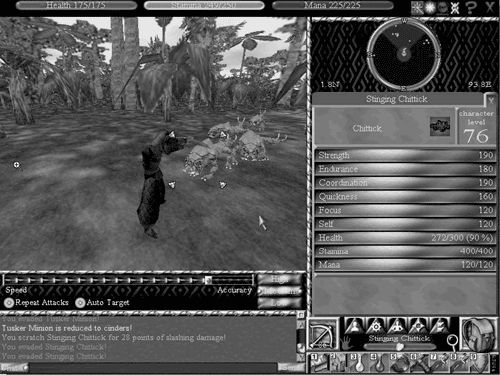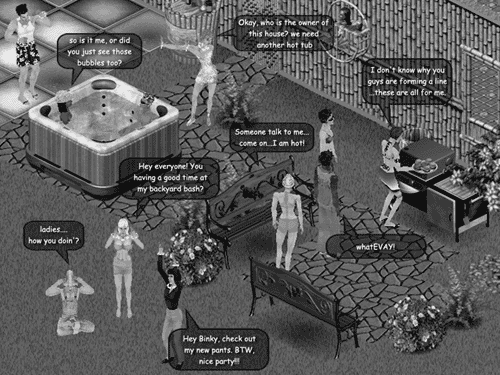It s the Socialization, Stupid
It's the Socialization , Stupid!In the end, an online game is really just a mechanism to allow players to socialize in a context. In the industry, we are fond of saying, "They come for the game and stay for the socialization." There is more than a little truth to that statement. Past a certain point in a player's "career" in a game, being with friends and associates online is more important than the game itself, or at least equally important. If both elements aren't present, the player really has no reason to stick around. This has manifested itself in the form of guilds and teams that stay together for years and sometimes move from game to game as whole entities if they find a game offering better tools for socialization and togetherness that enhance the bonds players form. Many designers go wrong by assuming that the gameplay will always be the primary reason for being there and pay more attention to adding content than to refining tools for establishing and maintaining social bonds . All Players SocializeSo why aren't developers building better socialization tools? For games that depend on good communications and affiliations between the players, the industry seems to have real trouble coming up with decent chat and teaming tools. They are so bad, in fact, that most people use a third-party tool, such as AOL's Instant Messenger (AIM) or ICQ, for in-game communications whenever possible. This has been an issue for something as basic as chatting, as some games, such as Sony Online's popular EQ , used to take over the main loop of the computer and prevent the game from being windowed or the use of <ALT+TAB> to toggle out to a separate application such as AIM or ICQ. This was done for security reasons (it is easier to hack a client that can be run in the background and allow the use of other applications), but with in-game chat tools being, on the whole, so bad compared to the third-party utilities, it makes it more difficult for players to coordinate among themselves . [7]
Interface designers need to take fully into account the need of the players to socialize and communicate on a variety of levels ”from two people whispering to private team communications ”and build such tools into a game from the outset. Robust Chat ToolsMany games still hearken back to their text MUD roots and require players to use "slash" commands to talk (they need to type the slash character (/) to communicate or issue special commands). In these days of graphic point-and-click interfaces, this seems absurd and is yet another indication that designers and developers tend to build games for themselves, not for the players. If you want to know what an in-game chat utility should look like, look at some good models that already exist: the interfaces and feature sets of AOL's Instant Messenger and ICQ. Most of the features of these chat utilities are not very difficult to implement, and they center on the twin concepts of ease-of-use and being intuitive/easy-to-learn. Some games with fairly good chat tools include Asheron's Call ( AC ) and Anarchy Online ( AO ); they allow not only the use of standard MUD "slash" commands, but they also use a point-and-click interface as an alternative method. Figure 8.1 is an example of AC 's chat bar. Clicking on the Chat button at the lower left allows the player to assign another player as the default recipient. Figure 8.1. The AC chat bar, located at the bottom left of the screen. Figure 8.2 shows a different chat method used by Electronic Arts' The Sims Online , known as "barking." The chat text is typed in by the player and then displayed near or above the player who is "speaking." Figure 8.2. The chat method of The Sims Online. Note that what the player types appears over the head in a balloon. This is known in the industry as "barking chat." At minimum, your chat tools should allow players to do the following:
Other features may be added at your discretion, but each should allow the player more freedom to create customized chat groups and, in general, make communication easier, not more difficult to use or understand. Full-Featured Guild/Team Organization Commands at LaunchThe capabilities to form and control permanent guilds and create temporary teams on-the-fly (usually for a limited game session to hunt, share loot, and experience awards) are going to appeal to the core , critical mass of your game players. Of all the games launched since 1997, only two have had good and fairly easy-to-use guild/teaming tools: UO and AC . Other games have managed to get them in place some time after launch, but this is the band -aid approach; the many players looking for team support at the outset may have already left to find another community for themselves and their friends. Guilds should have some inherent advantages, such as the ability to contribute to a common fund of equipment or game "gold," share or designate player-owned housing as a guild hall to store extra equipment for common use, and have private chat channel capability (if the use of private channels is not inherent within the game). These commands are important because they allow existing micro-communities to support themselves and recruit new members; they are both acquisition and retention tools in that sense. At an absolute minimum, your guild commands should include the following. Note that the term "guild" used here can also mean any form of permanent team structure, such as a squadron in a flight simulator:
You probably can't go overboard in providing customization or utilization commands to guilds or teams. This is the heart of the game for these players; anything that allows the heart to beat more efficiently becomes a retention feature. Other Tools That Foster Micro-CommunitiesSince the presence of micro-communities such as guilds and teams is critical to a PW game's success, plan extensive features that speak directly to their needs. Following are some of these needs:
|
EAN: 2147483647
Pages: 230

